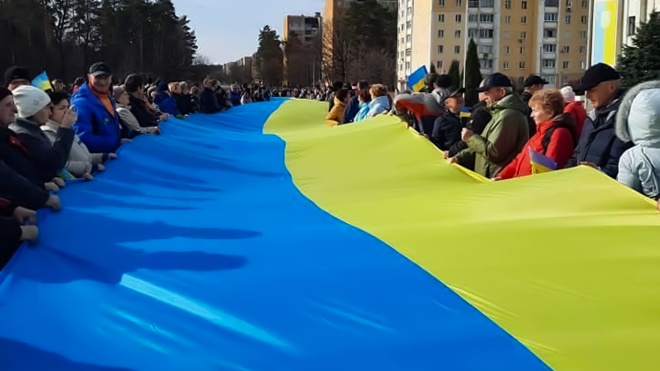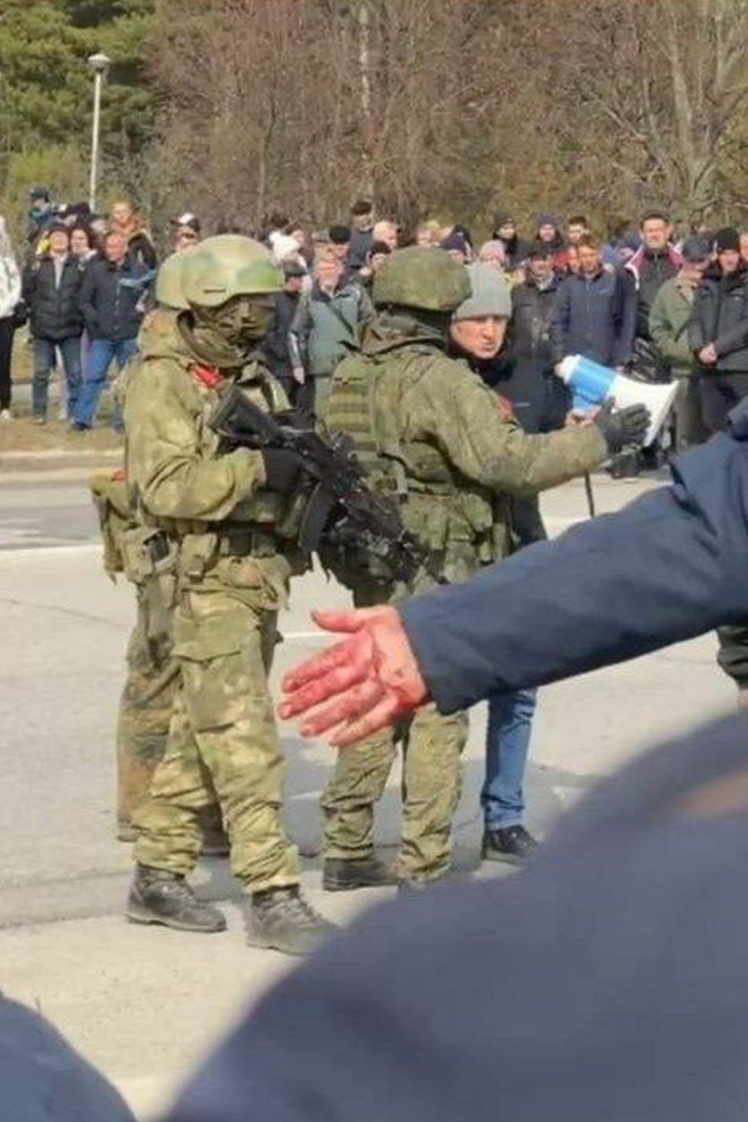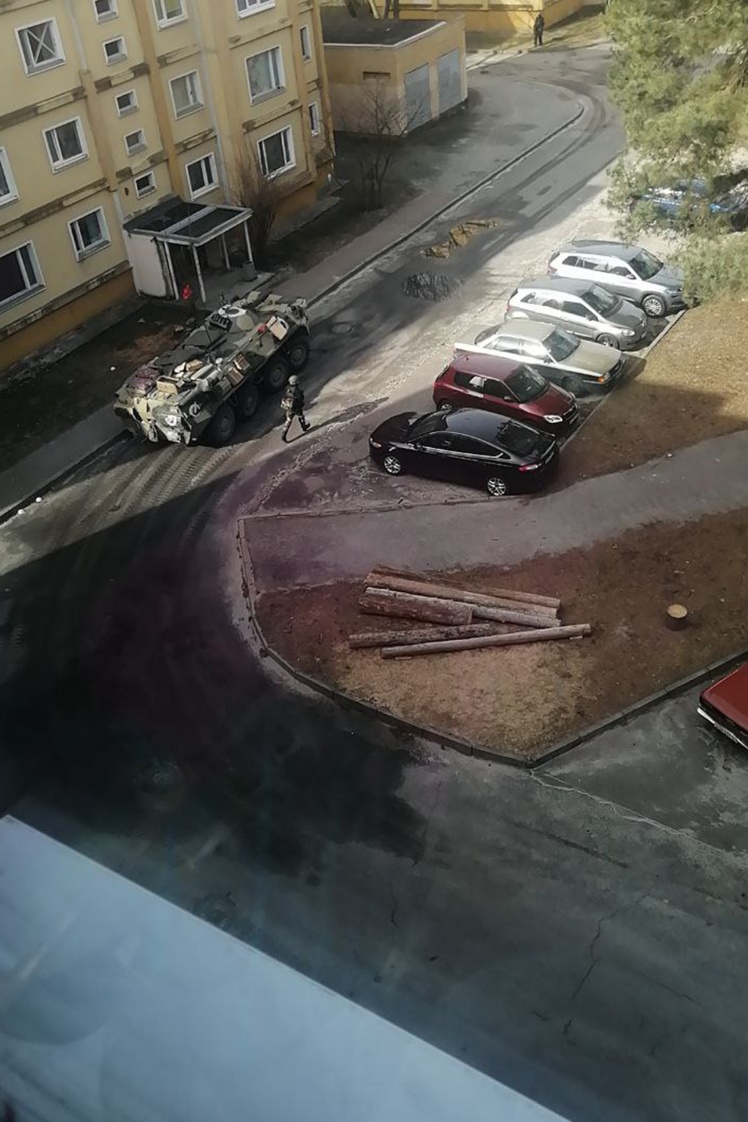30-year-old Tanya Koneva lives in Slavutych but works in Kyiv. On February 24, when the war began, Tanya was in the capital. She immediately decided that she would go to Slavutych. On the first day of the war it was still possible to get there.
– The city was quiet then. Of course, there were queues in shops, but not as big as in Kyiv. Shops and supermarkets were completely filled [with goods].
The next day Slavutych was blocked. According to the mayor Yuri Fomichov, it was “deeply behind the enemy lines”. Slavutych is administratively subordinated to Kyiv Oblast but is actually located in Chernihiv Oblast. It is located only 56 kilometers from Chernihiv, and 12 kilometers from the Belarus border. There is no direct road to Kyiv.
– Fighting has begun near Chernihiv, and Chernihiv is the only logistical exit to the “great world” for us. Intense battles had just begun near Chernihiv, so it was almost impossible to leave the city, – explained Fomichev.
Gradually, stores started running out of food. Then the electricity in the city disappeared due to damage to the power line at the Chernobyl nuclear power plant, which feeds Slavutych. There was not any gas in the city either, so residents began to cook on fires.
– For about a week, the city smelled of these fires, – adds Tanya. – Of course, because there was no electricity, all the frozen food the people had was spoiled. Almost immediately, farmers from nearby villages brought us potatoes and milk. They were helping us as much as they could.
Yuriy Fomichev also says that the food came to the city “through guerrilla paths”.
– We found a corridor through the forest, where small vehicles can pass, and gradually began to import food, medicine, and fuel – says Fomichev.
Slavutych was built after the Chernobyl accident, so many people in the city work at the nuclear power plant. The Russians captured Chernobyl on the first day of the invasion.
- Since the first day, we have been negotiating to change the staff [who was at the station during the capture]. People were definitely not ready to stay there for 26 days, without change of clothes and any living conditions. On day 27, we managed to change some of the personnel. I canʼt tell you exactly how, but we sent other people, – said Yuriy Fomichev.
According to Fomichev, there are no occupiers at the station, there is only personnel, but the perimeter is occupied. As it was known from Ukrainian intelligence data, the Russians were making trenches in the so-called Red Forest, where the radiation level is significantly higher. On March 30, Belarusian media reported that soldiers suffering from radiation exposure are being taken to a hospital in Gomel.
– We continue negotiations to make rotations more often, probably at least once in ten days. The occupiers offer them [station personnel] “humanitarian aid”, but our people refuse to accept it. They say, “We still have supplies, weʼll eat our cereals". They have more or less acceptable living conditions. There is a place to sleep, something to eat, and a place to take a shower, – added the mayor.
The occupiers entered Slavutych on March 26, after four days of fighting.
– It was March 22. It was a very beautiful sunny day, people were walking on the streets, children skated in a park. And there was a very unusual air raid siren, a warning of artillery fire. For about three days, we were hiding in the basement.
«Babel'»
– We were given an ultimatum: surrender, or we will fight you. The decision of the Territorial Defense, the National Police, and all others responsible for the security of the city was unequivocal. We accepted the fight. We agreed that we would not fight in the city and, in fact, all battles were on the outskirts. There was no way to receive military backup because all the settlements near Slavutych were under occupation. We had only artillery support.
In two days, the guys started having trouble holding off the enemy, so they were redeployed to another region to units of the Armed Forces of Ukraine, – continues Fomichev.
The day the occupiers entered the city, residents went to a rally.
– I have never seen so many people on the street. Our people are pretty passive. Even when some events and festivals were held in the city, people did not go out. And now it seemed that everyone in the city took to the streets — admits Tanya.
The occupiers moved in tanks marked with a “circle inside a square”, so many locals thought it was the military from Belarus. But Yuri Fomichev, who was captured by the occupiers for talks but released an hour later, says they were Russians.
- They threw stun grenades [at a peaceful rally] so that we dispersed. There were rumors that even military grenades were thrown, but I personally did not see it, although the people were wounded. Then the mayor came to us and said that the Russians would leave the city and stay at the checkpoints, but before that, they would search the city for weapons, – recalls the protest Tanya.
Now there is no enemy equipment and occupiers in the city. According to the mayor, they moved to the checkpoints. But the delivery of food and medicine remains the major issue.
The bread was given by coupons at the rate of one loaf per person.
The mayor says there are about 15,000 people left in Slavutych. Now, he is trying to arrange the humanitarian corridor at the highest level so that the majority of people could leave.
– We understand that it is impossible to feed the remaining citizens the way we did it [before the occupation], – he admits. According to him, there were no offers of so-called humanitarian aid from the occupiers, and even if they were, the city will not accept it.
– This [occupation] practically did not affect our lives. The city is alive, but we donʼt know what will happen next. There is no longer humanitarian aid coming from the nearby villages. We will have to live somehow on the available reserves.
On March 31, the occupiers finally left Slavutych, nearby villages, and Chernobyl. Yuriy Fomichev says that in the afternoon, the column of occupiers left the village of Mykhailo-Kotsyubynske, which was captured in the first days of the war, and moved towards Belarus.
– We keep in touch with nearby villages, and today at noon, the occupiers left the suburbs for Belarus and have already moved more than 40 kilometers in that direction. Now we are trying to solve humanitarian issues. We have already brought some food to the city. Volunteers come and take people to Kyiv. There is no green corridor, people use their own cars. – told us Fomichev.
He also confirmed that the occupiers had left the Chernobyl nuclear power plant. According to him, the Russians also took captured Ukrainian National Guardsmen with them.
Translated from Ukrainian by Olya Panchenko
"Babel" needs support from its readers now more than ever. If the work we do is important to you, please, send us a donation !



